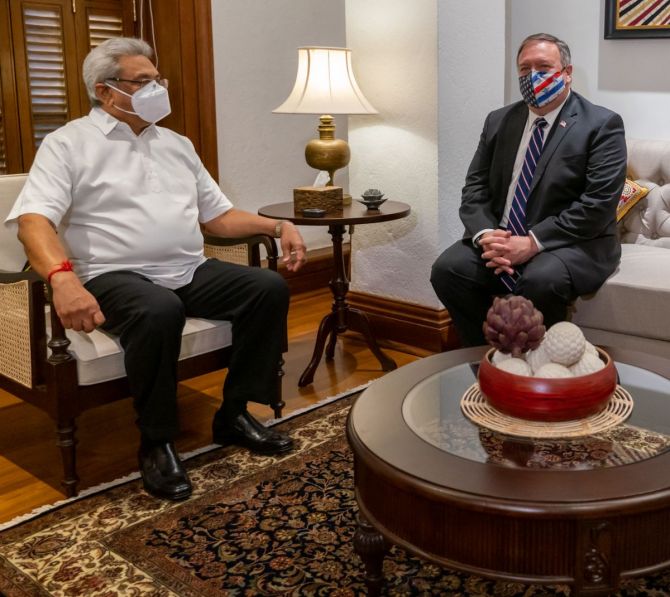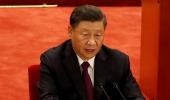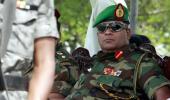Any form of entanglement with India or the US on the strategic plane will be anathema to Sri Lanka's Rajapaksa rulers, observes Ambassador M K Bhadrakumar.

Third-country cooperation is highly complex, unpredictable phenomenon. Not even the closest allies can pull it off easily.
Lord Curzon, the then British foreign secretary, denied that oil interests influenced policy in Iraq, but archives show that the British government rushed troops to Mosul in 1918 to gain control of the northern oil fields in a sharp course reversal to recoup what had already been given away to France under the secret Sykes-Picot Accord of early 1916.
Even before World War II had ended, Washington began wondering about how an exhausted Britain would adjust to a world where it had less power and influence vis-a-vis the US.
Then US secretary of state Edward Stettinius wrote to then President Frankin Delano Roosevelt, 'Never underestimate the difficulty an Englishman faces in adjusting to a secondary role.'
Matters came to a head with the Suez Crisis of 1956 when Britain and France sent troops to seize the Suez Canal and the US was not informed of the operation. President Dwight David Eisenhower hit back showing how power had shifted in the post-War world.
Ike blocked the IMF from granting Britain emergency loans unless it called off the invasion. Britain, militarily, never acted again against the explicit wishes of Washington.
Such lessons of history should not be forgotten, as India becomes an ally of the US. The nascent signs of India's 'bloc mentality' first appeared within months of the Modi government assuming power in May 2014.
Mahinda Rajapaksa later recounted with great bitterness that a high level of US-Indian political, diplomatic and intelligence coordination in that project had done him in.
The intricate plot apparently involved splitting the Sri Lankan ruling party by cultivating pockets of influence in the Sinhala Buddhist establishment to weaken Rajapaksa's political base and bringing in the hapless Jaffna Tamils as doormat.
Rajapaksa, a tough politician himself, was completely outwitted.
The regime change in Sri Lanka was the first of its kind in South Asia and bore striking resemblance to the US playbook in Latin America to undermine legitimate governments by using comprador elements and put in power 'our s.o.b' (as FDR once derisively called Nicaraguan dictator Anastasio Somoza García).
Indeed, it was a radical departure in India's foreign policy to have dragged a small neighbour to become a platform for its 'Indo-Pacific' strategy with the US -- a daring move, too, given Sri Lanka's robust record of nonalignment.
The present ruling elite in Colombo will remain extremely wary of the US and India. The happenings in next-door Maldives must have rung alarm bells already that eternal vigilance is the price of liberty.
Plainly put, any form of entanglement with India or the US on the strategic plane will be anathema.
This is the stark message coming out of the visit by US Secretary of State Mike Pompeo to Colombo on October 28. Pompeo's counterpart Dinesh Gunawardena said at a joint press meet, 'As a Sovereign, Free, Independent nation, Sri Lanka's foreign policy will remain neutral. Non-Aligned and Friendly.' Gunawardena was responding to Pompeo's overtures.
Importantly, the readout of President Gotabaya Rajapaksa's meeting with Pompeo says, 'Elaborating on the foreign policy of Sri Lanka, President said it is based on neutrality. Relations between Sri Lanka and other nations are determined by several conditions. Historical and cultural relations, development cooperation are some of the priorities.'
'President stressed that he is not ready to compromise the independence, sovereignty and territorial integrity of the nation in maintaining foreign relations whatever the circumstances may be.'
'Noting that China assisted in the development of the country's infrastructure since the end of the separatist war, President reiterated that Sri Lanka is not caught in a debt trap as a result.'
Simply put, the nadir has been reached for the 'Indo-Pacific' strategy in the Pearl of the Orient.
Without doubt, this constitutes a humiliating rebuff to the US-Indian fantasy that Sri Lanka could be frog-marched into the so-called Second Island Chain strategy in the Indian Ocean, alongside the Maldives which signed in September a Status of Forces Agreement (SOFA) with the Pentagon to build American military bases there.
In 2013, India resented the US efforts to sign a SOFA with the Maldives, but in September 2020, when the American efforts fructified, Delhi became ecstatic.
This must be the first instance in diplomatic history when a regional power congratulated its tiny neighbour for granting military bases to a superpower from the other side of the planet 16,000 kilometres away.
The obsession with collaring the Maldives clouds Delhi's judgment. The ruling elite blithely assume that having American military bases scattered over those 1,190 coral islands grouped in a double chain of 26 atolls, spread over roughly 90,000 square kilometres, serves India's long-term interests.
They suffer from dementia. They have forgotten the tragic story of Diego Garcia, which used to be part of Mauritius till 1965 and was rechristened British Indian Ocean Territory by London, only to be leased out to the US in 1967 to develop American bases.
There was strong opposition from littoral States of the Indian Ocean area -- including India -- who wished to preserve a non-militarised status in the region. However, the US simply rounded up the indigenous inhabitants, put them in overcrowded boats and dumped them on the beaches of Mauritius and Seychelles.
The UN overwhelmingly pleaded with the US to return Diego Garcia to its rightful owners but Washington, which swears by 'rules-based international order', simply thumbed the nose at it.
Do not rule out if a similar fate awaits the half million Maldivians at some point. The great game in the Indian Ocean is only beginning.
This geographical base is estimated to contain 62% of the world's oil reserves, 35% of its gas, 40% of gold reserves, over 60% of uranium and 80% of its diamond reserves. Any doubt who will want to monopolise this fabulous wealth?
At best, Americans might send a bagful of diamonds to Surat for polishing before selling them in Midtown Manhattan's Diamond District.
Make no mistake, the military bases in the Maldives will be a great asset for Americans to keep Indians under check. They must be anticipating already that some day an authentic nationalist ruling elite might appear in the corridors of power in Delhi elbowing out the pretenders, and revert India to independent foreign policies.
The mystique of geopolitics is such that you never know what lies in the womb of time. Just return for a moment to the fag-end of the Cold War
Margaret Thatcher and Francois Mitterand were so deeply sceptical about the wisdom of Mikhail Gorbachev's plan to disband the Warsaw Pact that they descended on Moscow to prevail upon the Soviet leader to go slow on the unification of Germany, while Washington on the other hand was lustily encouraging him to press ahead.
Yet, only thirty years ago, Lord Ismay (the Nainital-born first secretary general of NATO) had thought that NATO was formed 'to keep the Russians out, Americans in and Germans down.'
Already by the 1980s, the calculus had phenomenally changed.
Ambassador M K Bhadrakumar, who served the Indian Foreign Service for 29 years, played a stellar part in beginning India's systemic dealings in Afghanistan in 1994.











 © 2025
© 2025